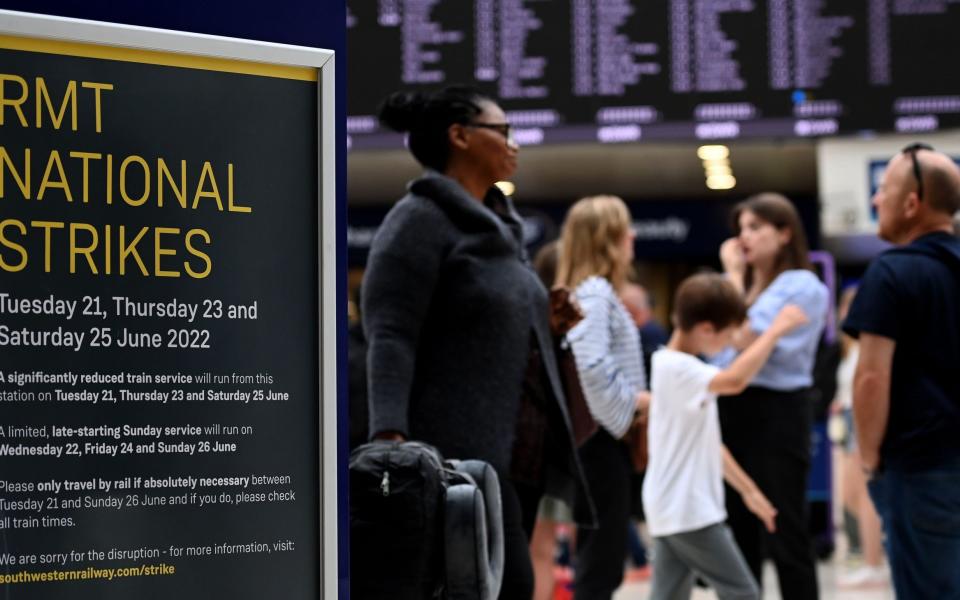Stop unions 'bullying public' by bringing in law, PM told

Boris Johnson is under mounting pressure to bring in the rail strike reforms he promised three years ago that would have curbed the industrial actions being taken this week.
Senior Tories have told The Telegraph that legislation to ensure a “minimum service” must be run during train strikes should be tabled now, despite ministers refusing to name a timeline.
The reform was promised in Mr Johnson’s December 2019 Tory election manifesto and his first Queen’s Speech, but got waylaid during the Covid pandemic and has since been sidelined.
The most recent Queen’s Speech in May, which sets out the Government’s legislative agenda for roughly the next year, made no mention of plans to bring forward strikes legislation.
A government source has privately admitted to this newspaper that a law making the change may not be tabled until 2023, given the lack of priority being given to it.
Minimum service rules block by law a total walkout by unions, as is being seen this week from rail workers. Similar laws already exist in Spain, France and Italy.
Grant Shapps, the Transport Secretary, and other ministers continue to support the move, but have provided no detail on when legislation will be tabled.
Theresa Villiers, the Tory MP for Chipping Barnet and a former rail minister, told The Telegraph: “Let’s get this legislation on the statute book to protect the people from irresponsible strikes in vital public services. The RMT is trying to bully the public.
“Laws to protect levels of service during strike action are a reasonable response. The test will be whether Labour will support these new laws. If they don’t, then it will be clearer than ever that they are on the side of strikers, not passengers.”
Huw Merriman, the Tory chairman of the House of Commons transport committee, said: “At a time when the cost of living is a challenge, we need every part of infrastructure to be delivering.
“The French, Spanish and Italians protect their railways by ensuring a third to a fifth of their railways have to operate during strikes.
“The Government will need to prepare to bring in its own minimum service obligation to protect our railways and the wider UK economy.”
One part of the Tories’ December 2019 election manifesto read: "We will require that a minimum service operates during transport strikes.
“Rail workers deserve a fair deal, but it is not fair to let the trade unions undermine the livelihoods of others."
The Queen’s Speech of the same month promised “railways minimum service levels legislation” and detailed what the legislation would look like.
One line in the Queen’s Speech briefing document read: “Minimum service agreements will set out the minimum service pattern to be provided during rail strikes, and the minimum number and nature of staff who shall work to provide that service.”
One government source said that the hope would be for the law to ensure that 20 per cent of regular rail services would have to continue during a strike.
But the law was never passed and fell off the political agenda during the Covid-19 pandemic, when there was a sharp drop in the number of people using the trains.
There is also pressure from Mr Shapps to take a more active role in the negotiations between the rail unions and both National Rail and the train operators.
Jake Berry, the Tory chairman of the Northern Research Group, told Times Radio: “By training, I'm a lawyer and I can tell you that the only way out of a dispute is via negotiation.
"I call on all parties, including the Government, to get around the table, because it's going to have a huge negative impact on people's lives.
"I actually just think it's really cruel as the country comes out of a really horrible period, to stop people reconnecting with their relatives, I just think is a deeply cruel and selfish thing to do."

